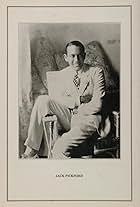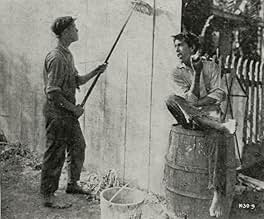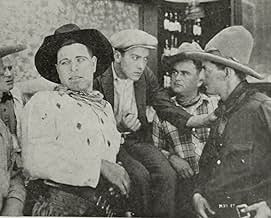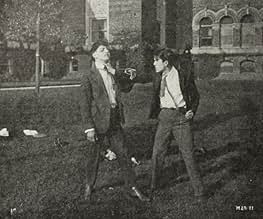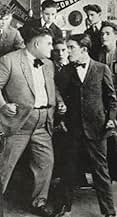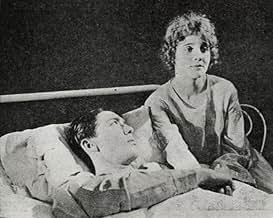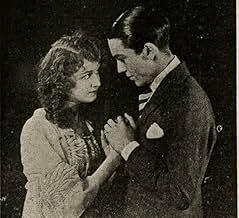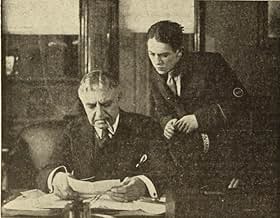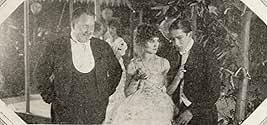Jack Pickford(1895-1933)
- Actor
- Director
- Producer
Nepotism certainly has had its advantages in Hollywood, none more so than in the cinematic career of Jack Pickford, whose famous older sis, "America's Sweetheart" Mary Pickford, saw to it that Jack had every advantage her star weight could muster. In Jack's case, it only added fuel to a self-starting tragic fire.
The youngest of three children, if Jack was christened with the extremely common name of John (aka Jack) Smith, his life would resemble anything but. Born in Toronto, Canada, on August 18, 1896, his middle sister was minor actress Lottie Pickford (née Charlotte Smith, (1893-1936)). Both younger children were prompted by their actress/mother, Charlotte Smith, to follow Mary (née Gladys Louise Smith) into show business after her husband (also John Charles Smith), an alcoholic, deserted the family.
A child actor on the theatre stage, it was Mary who got both her baby brother and baby sister into the Biograph film company as steady fixtures starting in 1909. They all appeared in scores of short films for D.W. Griffith -- Jack's list included Wanted, a Child (1909), To Save Her Soul (1909), The Smoker (1910), Muggsy Becomes a Hero (1910), Sweet Memories (1911), As a Boy Dreams (1911), The Speed Demon (1912), Heredity (1912), The Sneak (1913) and Home, Sweet Home (1914). Lottie had her own lead pictures, including The Pilgrimage (1912) and They Shall Pay (1921). Mary, Jack and Lottie all appeared together in the films Sweet Memories (1911) and Fanchon, the Cricket (1915), among others. Jack occasionally worked for other film companies, as he did when he played the title role in Giovanni's Gratitude (1913) for Reliance; and starred in The Making of Crooks (1915), The Hard Way (1916), The Conflict (1916) and Cupid's Touchdown (1917) for Selig Polyscope,
Jack followed along with sister Mary when she left Biograph and moved to the Famous Players Film Company (later Paramount Pictures) in 1914, and proved a personable light leading man. When Mary signed her famous million-dollar contract with First National in 1917, one of her stipulations was that Jack receive a lucrative contract as well. He appeared with Mary in such films as A Girl of Yesterday (1915) and Poor Little Peppina (1916), and starred on his own as lovelorn Bill Baxter in Seventeen (1916); as Pip in Great Expectations (1917); as Jack in The Dummy (1917); and as Tom Sawyer in both Tom Sawyer (1917) and Huck and Tom (1918); as well as the title roles in His Majesty, Bunker Bean (1918), Mile-a-Minute Kendall (1918) and Sandy (1918) (all co-starring lovely Louise Huff, and the films Freckles (1917), The Girl at Home (1917), What Money Can't Buy (1917) and Jack and Jill (1917).
The young man, however, just couldn't stay out of trouble. A 1918 stint in the Navy Reserve to straighten up proved disastrous when Jack, among others, was accused of accepting bribes from draftees who wanted light shore duty and stay out of front-line action. With the help of his family, he avoided a court martial, was exonerated and received a general discharge -- more than he deserved.
Earning a modicum of naïve "boy-next-door" success, Jack went on to produce a few of his own films (Burglar by Proxy (1919), Garrison's Finish (1923) and In Wrong (1919)), as well as co-direct (with Alfred E. Green) a couple of Mary's films (Through the Back Door (1921) and Little Lord Fauntleroy (1921)). Some of Jack's better silents during the "Roaring 20's" included The Little Shepherd of Kingdom Come (1920), The Man Who Had Everything (1920), Waking Up the Town (1925), The Goose Woman (1925), Brown of Harvard (1926) and the classic Beatrice Lillie backstage comedy vehicle Exit Smiling (1926) as a young leading man of the troupe.
Tragically, Jack's obsessive taste for the high life quickly took over. A ne'er-do-well playboy and constant carouser, his scandalous private life aroused more public interest than his on-camera work in light romantic films. He picked up severe alcohol, drug and gambling addictions to accommodate his partying decadence with bouts of syphilis adding to the complications. Jack's wedded life was anything but blissful. All three wives were Ziegfeld girls at one time. His stormy marriage to despondent, drug-addicted first wife, actress Olive Thomas, ended after four years when the 25-year-old died by swallowing mercury bichloride. His next two marriages to legendary Broadway musical star Marilyn Miller and minor actress Mary Mulhern also ended quickly due to his acute alcoholism.
By the late 1920s Jack was completely undependable and, with the advent of sound, his career ground to a screeching halt, despite Mary's continued attempts to rescue it. Jack's health deteriorated considerably after this letdown. His last two films were the (lost) silent feature (with talking sequences) The Dancer Upstairs (2002) co-starring Olive Borden and a lead in the short film All Square (1930).
He died aged 36 on January 3, 1933, in Paris. The cause was listed as "progressive multiple neuritis", but it was almost certainly precipitated by his chronic alcoholism-- a tragic and seemingly unnecessary end for a young man who chose to tarnish the silver platter readily handed to him. Sister Lottie too fell into extreme excess and died in 1936 at age 43 of alcohol-related causes. Jack later earned a star on the Hollywood Walk of Fame.
The youngest of three children, if Jack was christened with the extremely common name of John (aka Jack) Smith, his life would resemble anything but. Born in Toronto, Canada, on August 18, 1896, his middle sister was minor actress Lottie Pickford (née Charlotte Smith, (1893-1936)). Both younger children were prompted by their actress/mother, Charlotte Smith, to follow Mary (née Gladys Louise Smith) into show business after her husband (also John Charles Smith), an alcoholic, deserted the family.
A child actor on the theatre stage, it was Mary who got both her baby brother and baby sister into the Biograph film company as steady fixtures starting in 1909. They all appeared in scores of short films for D.W. Griffith -- Jack's list included Wanted, a Child (1909), To Save Her Soul (1909), The Smoker (1910), Muggsy Becomes a Hero (1910), Sweet Memories (1911), As a Boy Dreams (1911), The Speed Demon (1912), Heredity (1912), The Sneak (1913) and Home, Sweet Home (1914). Lottie had her own lead pictures, including The Pilgrimage (1912) and They Shall Pay (1921). Mary, Jack and Lottie all appeared together in the films Sweet Memories (1911) and Fanchon, the Cricket (1915), among others. Jack occasionally worked for other film companies, as he did when he played the title role in Giovanni's Gratitude (1913) for Reliance; and starred in The Making of Crooks (1915), The Hard Way (1916), The Conflict (1916) and Cupid's Touchdown (1917) for Selig Polyscope,
Jack followed along with sister Mary when she left Biograph and moved to the Famous Players Film Company (later Paramount Pictures) in 1914, and proved a personable light leading man. When Mary signed her famous million-dollar contract with First National in 1917, one of her stipulations was that Jack receive a lucrative contract as well. He appeared with Mary in such films as A Girl of Yesterday (1915) and Poor Little Peppina (1916), and starred on his own as lovelorn Bill Baxter in Seventeen (1916); as Pip in Great Expectations (1917); as Jack in The Dummy (1917); and as Tom Sawyer in both Tom Sawyer (1917) and Huck and Tom (1918); as well as the title roles in His Majesty, Bunker Bean (1918), Mile-a-Minute Kendall (1918) and Sandy (1918) (all co-starring lovely Louise Huff, and the films Freckles (1917), The Girl at Home (1917), What Money Can't Buy (1917) and Jack and Jill (1917).
The young man, however, just couldn't stay out of trouble. A 1918 stint in the Navy Reserve to straighten up proved disastrous when Jack, among others, was accused of accepting bribes from draftees who wanted light shore duty and stay out of front-line action. With the help of his family, he avoided a court martial, was exonerated and received a general discharge -- more than he deserved.
Earning a modicum of naïve "boy-next-door" success, Jack went on to produce a few of his own films (Burglar by Proxy (1919), Garrison's Finish (1923) and In Wrong (1919)), as well as co-direct (with Alfred E. Green) a couple of Mary's films (Through the Back Door (1921) and Little Lord Fauntleroy (1921)). Some of Jack's better silents during the "Roaring 20's" included The Little Shepherd of Kingdom Come (1920), The Man Who Had Everything (1920), Waking Up the Town (1925), The Goose Woman (1925), Brown of Harvard (1926) and the classic Beatrice Lillie backstage comedy vehicle Exit Smiling (1926) as a young leading man of the troupe.
Tragically, Jack's obsessive taste for the high life quickly took over. A ne'er-do-well playboy and constant carouser, his scandalous private life aroused more public interest than his on-camera work in light romantic films. He picked up severe alcohol, drug and gambling addictions to accommodate his partying decadence with bouts of syphilis adding to the complications. Jack's wedded life was anything but blissful. All three wives were Ziegfeld girls at one time. His stormy marriage to despondent, drug-addicted first wife, actress Olive Thomas, ended after four years when the 25-year-old died by swallowing mercury bichloride. His next two marriages to legendary Broadway musical star Marilyn Miller and minor actress Mary Mulhern also ended quickly due to his acute alcoholism.
By the late 1920s Jack was completely undependable and, with the advent of sound, his career ground to a screeching halt, despite Mary's continued attempts to rescue it. Jack's health deteriorated considerably after this letdown. His last two films were the (lost) silent feature (with talking sequences) The Dancer Upstairs (2002) co-starring Olive Borden and a lead in the short film All Square (1930).
He died aged 36 on January 3, 1933, in Paris. The cause was listed as "progressive multiple neuritis", but it was almost certainly precipitated by his chronic alcoholism-- a tragic and seemingly unnecessary end for a young man who chose to tarnish the silver platter readily handed to him. Sister Lottie too fell into extreme excess and died in 1936 at age 43 of alcohol-related causes. Jack later earned a star on the Hollywood Walk of Fame.
